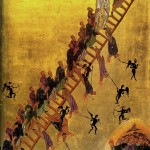![Open bible on the table in the church - by Petr Kratochvil (open-bible-11288023214vduX) (CC0 1.0 [https://creativecommons.org/publicdomain/zero/1.0/]), via Public Domain Pictures](https://wp-media.patheos.com/blogs/sites/721/2017/03/open-bible-11288023214vduX-1024x682.jpg)
It turns out that the Great Fast started out as a catechumens’ fast during Great Week in preparation for their reception into the Church at Pascha. This is why instead of the usual Trisagion, we use the Baptismal Trisagion during the Paschal Liturgy: All you who have been baptized into Christ, you have put on Christ, alleluia.
My spiritual father explained that in time, the fast expanded to the forty days before Pascha, and what’s more, the rest of the Church felt a bit jealous that only the catechumens got to fast. And so it was that we all started to fast.
This means that the Great Fast is an excellent time for me to relive my catechumenate.
Part of reliving my catechumenate, I’m realizing, is to remember the Protestantism from which I came. As Chinglican and then on ‘Religion Ethnicity Wired,’ I got involved with quite a few of the debates about what the Christianity Today writer Collin Hansen calls ‘New Calvinism,’ including writing a joke post about the former Seattle megachurch pastor Mark Driscoll being a hyper-traditionalist Catholic. I also got involved in some discussions about Anglicanism in my hometown of Vancouver. I even was involved in authoring an open letter about a Protestant Christian’s ignorant remarks to a Vancouver newspaper about the Hong Kong’s Umbrella Movement.
But ever since becoming Eastern Catholic, I have often felt that there is something unseemly about commenting too much about Protestants and their ecclesial homes. In my Eastern Catholic Church – the Greek-Catholic Church of Kyiv – we often talk about our ecclesial autonomy even though Rome, Constantinople, and Moscow each want a piece of us, and because of that, I’ve been taught to respect the autonomy of Protestants too.
Yet I began this Great Fast writing about Franklin Graham’s visit to Vancouver and what I saw was an ineffective liberal attempt to oppose it. As this Great Fast has unfolded, there has been a blow-up around Princeton Theological Seminary over its committee for the Abraham Kuyper Prize for Excellence in Reformed Theology and Public Witness rescinded its cash award to the Presbyterian megachurch pastor Tim Keller. Some fun news from the Southern Baptist Convention has also revealed that there is a turf war about New Calvinism in its ranks, mostly about smoking and drinking beer, apparently.
I have been, as usual, commenting and laughing on social media about all of this, but as requests have rolled in to blog, I have been hesitant once again, even though I did blog about Franklin Graham in Vancouver – to which I got all kinds of complaints that I did not speak ‘in plain language,’ by which I think my critics mean that I do not speak Protestant anymore. What’s more, while on social media, people have been trying to hold me accountable to be ‘biblical,’ and they even say that we are ‘part of the same church,’ to which I answer we are not, rankling some Protestants because their ecclesiology tends to be more ideological than material, based on assent on propositions rather than the actual material fact of whether we can take communion together. I also got more than one commentator identifying as ‘Reformed’ in the comment boxes, to which I want to make two replies: 1) ‘Reformed’ means all manner of things, and 2) there was this one time that the Patriarch of Constantinople got so mad at us Eastern Catholics for signing the Union of Brest that he literally became Reformed too and wrote a Confession that was way too Calvinist for Orthodox comfort.
All of this has me reliving my catechumenate, of course, not least because during my catechumenate, it could be said that some Protestants did not know that I was catechumenating, and because of this, they just assumed that my Christianity abided by Protestant norms. Now that I am Eastern Catholic, I am still facing such Protestant normativity – and at an even more heightened level during the Great Fast.
Yet for some reason, I am not offended. In some ways, it is heartening to see my Protestant sisters and brothers, though we cannot take communion, confusing me for one of them because they still read me as Christian. Confusing as this might be, there is hope for walking together ecumenically, though I do not think that pretending we are part of the same church is healthy, as it distorts the historical realities of our broken communion and our need to work together to mend the very material schisms in the Body of Christ. It was, after all, Protestants who taught me that the point of psychotherapy is to uncover all the traumas of the past so that they can be dealt with openly. Perhaps such openness about our sordid past can be a new baseline for walking together too.
In this way, I suppose this Great Fast, I am struggling with the language that I need as an Eastern Catholic for such conversations, especially as I think I will still continue to write about Protestants both professionally and personally. For that, I will continue to need discernment, and because of this, I’d say that that’s a good reason to keep fasting.












